Description
1954 Tour de France
The 1954 Tour de France was the 41st edition of the Tour de France, taking place from 8 July to 1 August 1954. It consisted of 23 stages over 4,656 km (2,893 mi). The race was won by Louison Bobet, the second of his three consecutive wins.
Teams
As was the custom since the 1930 Tour de France, the 1954 Tour de France was contested by national and regional teams. Seven national teams were sent, with 10 cyclists each from France, the Netherlands, Belgium, Spain, Switzerland, and Luxembourg/Austria (the latter a combined team). France additionally sent five regional teams of 10 cyclists each, divided into North-East/Centre, West, South-East, Île-de-France, and South-West. The combined team Luxembourg/Austria consisted of six Luxembourger cyclists, three Austrian cyclists and one from Liechtenstein. In total, 110 cyclists started the race.
Notable absent were the Italian cyclists. In Italy, new sponsors had entered the market, named “extra-sportives,” because they did not sell a product directly related to the sport. During the 1954 Giro d’Italia, this caused a strike, the Bernina strike. After this, the Italian federation decided not to send a team to the 1954 Tour de France. In May, Italian Cycling Federation head Adriano Rodoni announced that Italian riders would not participate in the Tour.
Route and Stages
The 1954 Tour de France was the first time that the Tour had started outside France, as it started in Amsterdam. Also new was the team time trial. Although around 1930, the Tour had seen stages in which the teams started separately, in 1954, the team time trial format was reintroduced in a way that only the team time counted. Also the split stages were reintroduced. Stage 4 was divided into two parts: the team time trial of 10.4 km (part A), and a regular stage of 131 km (part B), both run on the same day. Similarly, stage 21 was divided into a regular stage of 134 km (part A) and an individual time trial of 72 km (part B), also both run on the same day. There were two rest days, in Bordeaux and Lyon. The highest point of elevation in the race was 2,556 m (8,386 ft) at the summit tunnel of the Col du Galibier mountain pass on Stage 19.
Race Overview
In the first stage, Wout Wagtmans won the sprint and took the yellow jersey. He would remain the leader until the team time trial in stage 4 when the French team won back enough time on the Dutch team for Bobet to take over the lead. In that time trial, over 10.4 km, the winning team was decided by adding the times of the three best cyclists per team. For the general classification, every cyclist got added his individual time. In the second part of the fourth stage, former winner Jean Robic hit a photographer during the sprint, fell down, and had to give up.
In the eighth stage, Wagtmans joined a breakaway, which won enough time on Bobet for Wagtmans to take back the yellow jersey. Wagtmans fell down in the eleventh stage, and although he managed to keep his lead until the start of the twelfth stage, he continued without morale. In the twelfth stage in the Pyrenees, three important riders attacked: Bauvin, Bahamontes, and Malléjac. They stayed ahead, and Bauvin jumped to the first position in the general classification. Bobet was not far behind these three and moved into second place. In that twelfth stage, Hugo Koblet had fallen and lost 27 minutes, and his chances to win the Tour de France a second time. In the next stage, Koblet gave up.
In the fourteenth stage, the Swiss cyclists were fighting back. They were riding as fast as they could, and the leading group was getting smaller. Bauvin also could not keep up with that group, partly because he had a flat tire, and finished 8 minutes behind, losing the leading position. Bobet, however, could keep up with the Swiss pace and took over the yellow jersey as leader of the general classification.
In the sixteenth stage, Bauvin lost another 20 minutes and dropped to sixth place. The Swiss cyclists had attacked Bobet where they could but were unable to gain time on him. They had moved into second and third place in the general classification. In the eighteenth stage, Bobet dominated and dropped all of the other contenders. He won by a margin of one minute and 49 seconds, and his margin in the general classification was 12 minutes 49 seconds, which would normally be large enough for victory.Bobet also won the individual time trial, and thereby increased his margin even more.
The Swiss cyclists could not attack Bobet anymore in the last stages, so Bobet won his second Tour de France. The Swiss team had performed well, though, capturing the second and third place in the general classification, winning the team classification, and having Kübler win the points classification.
Excerpt from Wikipedia – Read the full article here
*********************************
This item is one of a kind; please look carefully at the photos to determine the condition.
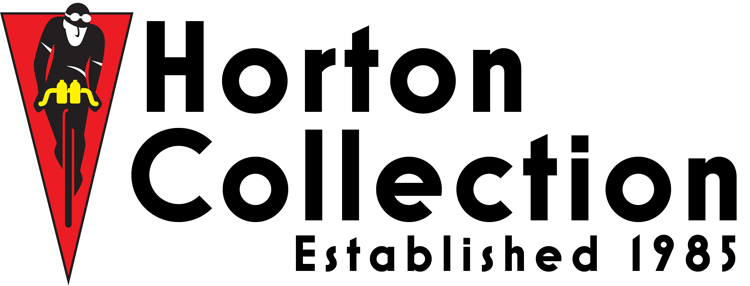
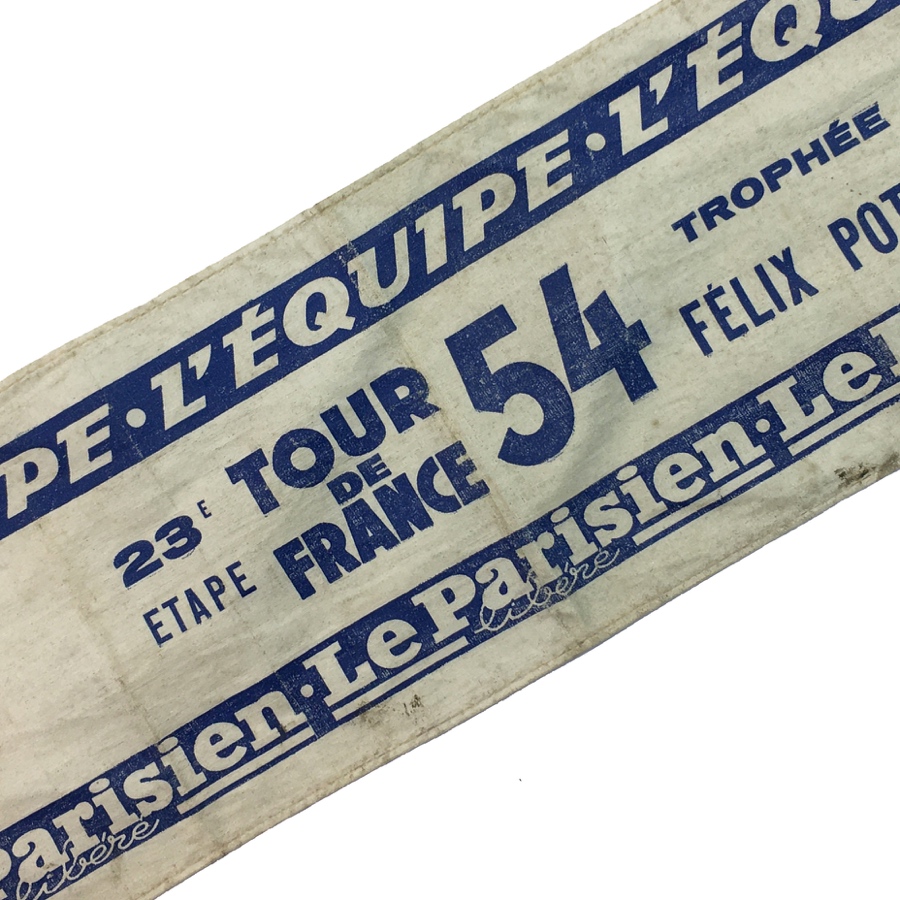
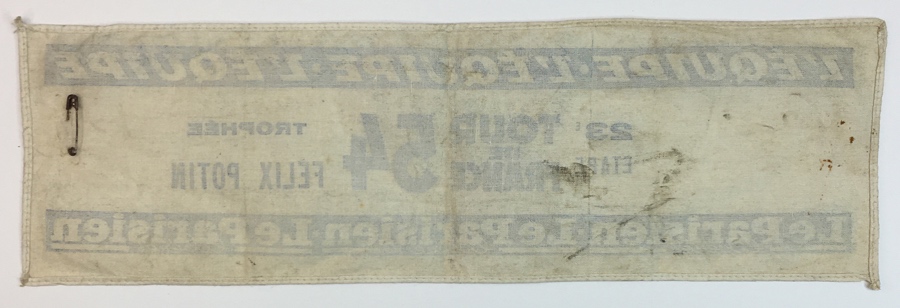
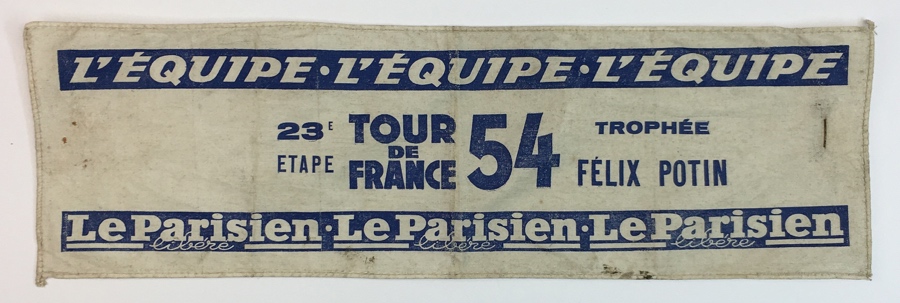
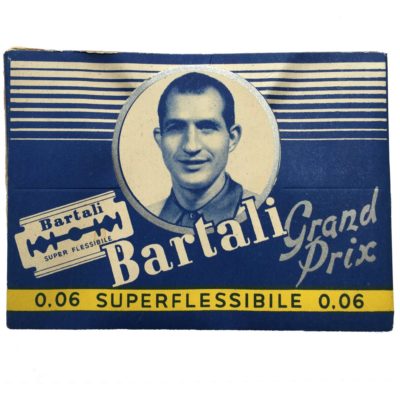
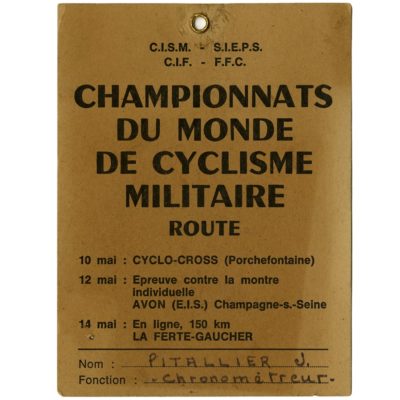
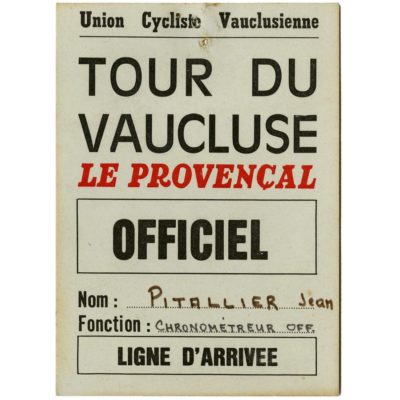
Recent Comments